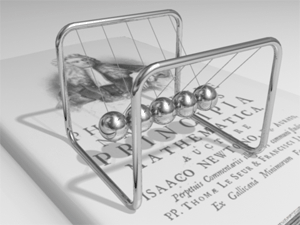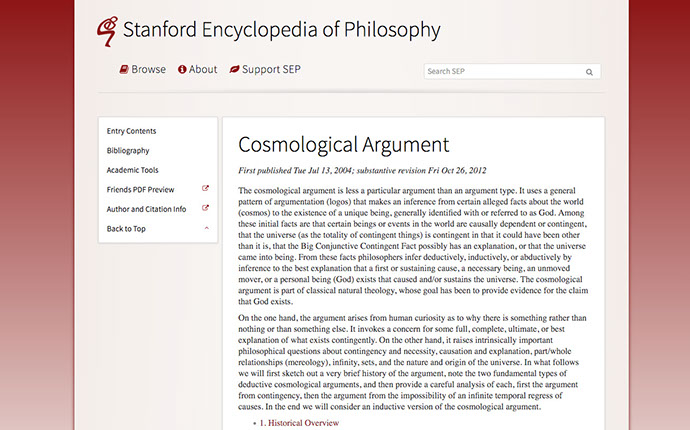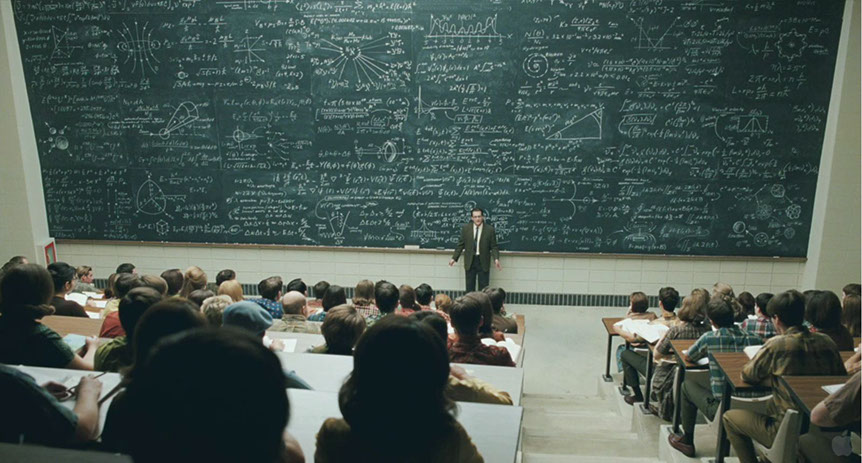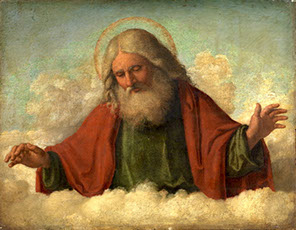GOD EXISTS
SAINT THOMAS AQUINAS
Article 3. Whether God exists?
It seems [to some] that God does not exist...
On the contrary, It is said in the person of God: "I am Who am." (Exodus 3:14)
I answer that, the existence of God can be proved in five ways.
The latin word Aquinas uses here is "motus," which means to move or change. Aquinas is not just talking about physical movement here.
The Text
The Argument
Explanation
Further Discussion
It is certain, and evident to our senses, that in the world some things are in motion. Now whatever is in motion is put in motion by another, for nothing can be in motion except it is in potentiality to that towards which it is in motion; whereas a thing moves inasmuch as it is in act. For motion is nothing else than the reduction of something from potentiality to actuality. But nothing can be reduced from potentiality to actuality, except by something in a state of actuality.

Thus that which is actually hot, as fire, makes wood, which is potentially hot, to be actually hot, and thereby moves and changes it.
Now it is not possible that the same thing should be at once in actuality and potentiality in the same respect, but only in different respects. For what is actually hot cannot simultaneously be potentially hot; but it is simultaneously potentially cold. It is therefore impossible that in the same respect and in the same way a thing should be both mover and moved, i.e. that it should move itself. Therefore, whatever is in motion must be put in motion by another. If that by which it is put in motion be itself put in motion, then this also must needs be put in motion by another, and that by another again. But this cannot go on to infinity, because then there would be no first mover, and, consequently, no other mover; seeing that subsequent movers move only inasmuch as they are put in motion by the first mover; as the staff moves only because it is put in motion by the hand. Therefore it is necessary to arrive at a first mover, put in motion by no other; and this everyone understands to be God.
Note: Motion is a reduction from potentiality to actuality.
- In the world some things are in motion
- Now whatever is in motion is put in motion by another
- But nothing can be reduced from potentiality to actuality, except by something in a state of actuality.
- And it is not possible that the same thing should be at once in actuality and potentiality in the same respect, but only in different respects.
Conclusion 1: Therefore, it is impossible that in the same respect and in the same way a thing should be both mover and moved, i.e. that it should move itself.
5. Whatever is in motion must be put in motion by another.
6. If that by which it is put in motion be itself put in motion, then this also must needs be put in motion by another, and that by another again.
7. But this cannot go on to infinity, because then there would be no first mover, and, consequently, no other mover).
Conclusion 2: Therefore it is necessary to arrive at a first mover, put in motion by no other, and this everyone understands to be God.

Aquinas's Example:
That which is actually hot (fire) makes wood, which is potentially hot, to be actually hot, and thereby moves and changes it.
Let's get clear on some of the key concepts at play in this argument...
A brief, accessible overview of the argument
The Argument from Causation
Think of "causation" here in a broad sense. It refers to any causes that bring about effects in the world. For example, parents are the joint causes of their children. The cause of a sculpture is the artist who created it.
The Text
The Argument
Explanation
Further Discussion
The second way is from the nature of the efficient cause. In the world of sense we find there is an order of efficient causes.
There is no case known (neither is it, indeed, possible) in which a thing is found to be the efficient cause of itself; for so it would be prior to itself, which is impossible. Now in efficient causes it is not possible to go on to infinity, because in all efficient causes following in order, the first is the cause of the intermediate cause, and the intermediate is the cause of the ultimate cause, whether the intermediate cause be several, or only one. Now to take away the cause is to take away the effect. Therefore, if there be no first cause among efficient causes, there will be no ultimate, nor any intermediate cause. But if in efficient causes it is possible to go on to infinity, there will be no first efficient cause, neither will there be an ultimate effect, nor any intermediate efficient causes; all of which is plainly false. Therefore it is necessary to admit a first efficient cause, to which everyone gives the name of God.
- Nothing is the efficient cause of itself (for so it would be prior to itself, which is impossible).
- Now to take away the cause is to take away the effect.
- Therefore, if there be no first cause among efficient causes, there will be no ultimate, nor any intermediate cause.
- But if in efficient causes it is possible to go on to infinity, there will be no first efficient cause, neither will there be an ultimate effect, nor any intermediate efficient causes; all of which is plainly false.
- Thus, in efficient causes it is not possible to go on to infinity.
- Therefore it is necessary to admit a first efficient cause, to which everyone gives the name of God.
Here's a brief overview of the argument...
Aquinas's second way is an example of a type of argument referred to as "cosmological arguments." Click here to read more about this kind of argument on the Stanford Encyclopedia of Philosophy

The Argument from Possibility
For Aquinas, a being is possible if it exists but could have failed to exist, either at a time, or altogether. You are a possible being. A being is necessary if it exists and couldn't have failed to exist. God is a necessary being, and perhaps the only one.
The Text
The Argument
Explanation
Further Discussion
We find in nature things that are possible to be and not to be, since they are found to be generated, and to corrupt, and consequently, they are possible to be and not to be. But it is impossible for these always to exist, for that which is possible not to be at some time is not. Therefore, if everything is possible not to be, then at one time there could have been nothing in existence. Now if this were true, even now there would be nothing in existence, because that which does not exist only begins to exist by something already existing. Therefore, if at one time nothing was in existence, it would have been impossible for anything to have begun to exist; and thus even now nothing would be in existence — which is absurd. Therefore, not all beings are merely possible, but there must exist something the existence of which is necessary. But every necessary thing either has its necessity caused by another, or not. Now it is impossible to go on to infinity in necessary things which have their necessity caused by another, as has been already proved in regard to efficient causes. Therefore we cannot but postulate the existence of some being having of itself its own necessity, and not receiving it from another, but rather causing in others their necessity. This all men speak of as God.
- Since objects in the universe come into being and pass away, it is possible for those objects to exist or for those objects not to exist at any given time.
- Since objects are countable, the objects in the universe are finite in number.
- If, for all existent objects, they do not exist at some time, then, given infinite time, there would be nothing in existence. (Nothing can come from nothing—there is no creation ex nihilo) for individual existent objects.
- But, in fact, many objects exist in the universe.
- Therefore, a Necessary Being (i.e., a Being of which it is impossible that it should not exist) exists.
Reconstruction by philosophy dot lander dot edu

Let's get clear on some of the key concepts at play in this argument...
Interested in modality? Read more about it on the Standford Encyclopedia of Philosophy

The Argument from Gradation
In this argument Aquinas makes the following inference: if some property can be spoken of as coming in greater and lesser degrees, then there must be some being that possesses that property in its maximal degrees. For instance, things can be more or less cold, therefore there is a maximally cold being. Many philosophers have challenged the validity of this inference.
The Text
The Argument
The fourth way is taken from the gradation to be found in things. Among beings there are some more and some less good, true, noble and the like. But "more" and "less" are predicated of different things, according as they resemble in their different ways something which is the maximum, as a thing is said to be hotter according as it more nearly resembles that which is hottest; so that there is something which is truest, something best, something noblest and, consequently, something which is uttermost being; for those things that are greatest in truth are greatest in being, as it is written in Metaph. ii. Now the maximum in any genus is the cause of all in that genus; as fire, which is the maximum heat, is the cause of all hot things. Therefore there must also be something which is to all beings the cause of their being, goodness, and every other perfection; and this we call God.
1. All things are more or less perfect, more or less beautiful, etc
2. But gradation of each perfections implies the existence of a being with the maximal degree of that perfection
3. And we know that that which is greatest in truth is also greatest in wisdom, beauty, and all the other perfections
4. So there exists a maximally perfect being, whom we call God

"I'm literally the best."
The Argument from Governance
This argument is often referred to as Aquinas's "Teleological Argument" and bears similarities to contemporary "Design Arguments" for God's existence. These arguments claim that, since the universe evinces obvious design, we can infer the existence of a divine designer or creator; God.
The Text
The Argument
Further Discussion
The fifth way is taken from the governance of the world. We see that things which lack intelligence, such as natural bodies, act for an end, and this is evident from their acting always, or nearly always, in the same way, so as to obtain the best result. Hence it is plain that not fortuitously, but designedly, do they achieve their end. Now whatever lacks intelligence cannot move towards an end, unless it be directed by some being endowed with knowledge and intelligence; as the arrow is shot to its mark by the archer. Therefore some intelligent being exists by whom all natural things are directed to their end; and this being we call God.
1. All things act toward some end or purpose
2. But only things that are designed act toward ends or purposes
3. Therefore all things are designed
4. But anything that's designed has a designer
5. Therefore a designer of all things exists, and this we call God


The "blobfish" was recently named the world's ugliest animal
"Totally intentional. I definitely made that on purpose"
William Paley is another philosopher who offered an argument from design. Here's a brief overview of that argument.
It seems that God does not exist; because if one of two contraries be infinite, the other would be altogether destroyed. But the word "God" means that He is infinite goodness. If, therefore, God existed, there would be no evil discoverable; but there is evil in the world. Therefore God does not exist.
Objection 1
As Augustine says (Enchiridion xi): "Since God is the highest good, He would not allow any evil to exist in His works, unless His omnipotence and goodness were such as to bring good even out of evil." This is part of the infinite goodness of God, that He should allow evil to exist, and out of it produce good.
Reply 1
Further, it is superfluous to suppose that what can be accounted for by a few principles has been produced by many. But it seems that everything we see in the world can be accounted for by other principles, supposing God did not exist. For all natural things can be reduced to one principle which is nature; and all voluntary things can be reduced to one principle which is human reason, or will. Therefore there is no need to suppose God's existence.
Objection 2
Since nature works for a determinate end under the direction of a higher agent, whatever is done by nature must needs be traced back to God, as to its first cause. So also whatever is done voluntarily must also be traced back to some higher cause other than human reason or will, since these can change or fail; for all things that are changeable and capable of defect must be traced back to an immovable and self-necessary first principle, as was shown in the body of the Article.
Reply 2


Created by Paul Blaschko and Meghan Sullivan, 2016
For more information, visit the website for God and the Good Life